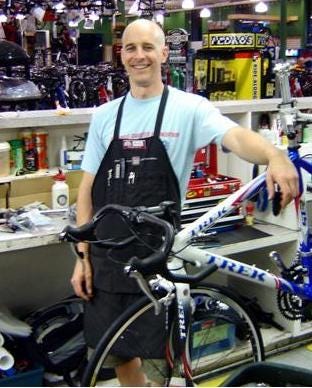When my youngest daughter was about five, and trying to learn how to ride a bike for the first time, she noticed there was a problem with her bike, which was a hand-me-down from her older sister. When the wheels turned, there was some sort of resistance, and also a grinding noise coming from the chain.
I considered an attempt at repair, and immediately decided there was zero probability of success, given my limited mechanical skills. So I suggested to my daughter that the grinding was probably not anything to worry about, and that she should just ignore it. She said nothing, but gave me a disapproving look. Then we drove down to the bike shop to get it repaired.
When we got there, I handed the bike to a mechanic, described the problem, and asked him if he could fix it. He put the bike on a table, did some quick assessments, and then said "Aha." Then he took out some specialized tools, loosened some things here, bent something else into a different shape, oiled another part, and within five minutes, the problem was completely fixed. The wheels moved smoothly and there was no grinding noise.
My first reaction was admiration, and my second reaction was ... jealousy. I would love to be able to “fix” my clients as easily as this guy just fixed my bike.
I’m a manual and movement therapist, so I try to help people who have movement problems that are similar to the problem with the bike – something isn't moving the right way, and its causing pain. Wouldn't it be amazing if I could examine the painful area, do a few assessments, then say “aha I see the cause of the problem - it’s this tight hamstring.” Or maybe: “your L5 vertebrae is out.” And then I could lengthen some fascia here, reposition some joints there, and then completely fix the problem within minutes.
There are many therapists who claim they can actually do this. Some of them have YouTube videos with 29 million views:
In my early days as a therapist, I took courses from instructors who promised they had methods to “fix” back pain. They would invite someone from the class onto the treatment table, ask them what the problem is, do a few tests, say “aha”, and then make a few corrective moves that lead to immediate improvement.
When I started applying their treatment formulas, I realized they seemed to work sometimes, but other times not at all. So I sought out more complicated treatment models, and then more complicated models and …
At some point I appreciated that human bodies are very different from machines, and that we shouldn’t expect to fix them the way a mechanic fixes a bike. The good news is that human bodies are amazingly adaptive, and therefore they can learn and heal. Adaptation is unpredictable, individual, and often painfully slow. Therapists can never really take control of that process, but they can facilitate it, speed it up, or make sure it doesn't get stuck in a rut.
This is obvious to many therapists, but for others it is a painful realization, so they avoid it. It kills the dream of finding a magic bullet for pain, and takes a bite out of the ego too.
Anyway, let's get back to the bike story, because the second chapter fits in well with my not-so subtle metaphor.
A few hours after the bike was fixed, my daughter succeeded in riding without training wheels for the first time. She solved a movement problem, using her coordination, bravery and determination. But I get some credit too, because I knew the time was right for the training wheels to come off, I made sure she didn’t fall and hurt herself, and I found a good place to ride. And I didn't bother her with a bunch of dumb advice about how to ride, I just let her do her thing in the way she wanted. And I brought snacks.
I’m sure she would have learned to ride even without my help. It might have taken a few extra months, and she might have got hurt in the process. So I was helpful, but not the star of the show.
Which is a lot like how good therapists help with back pain. But not like a bike mechanic, whose fix-it skills I will continue to envy just a little bit.






Great post Todd! I like that you honor the urge for things to be 'easy.'
Sometimes my clients come to me and ask how to be 'fixed.' How I wish it were so simple!
yep, most good work with human beings is inquiry, not formulas - even though the "quick fix" can be so seductive!